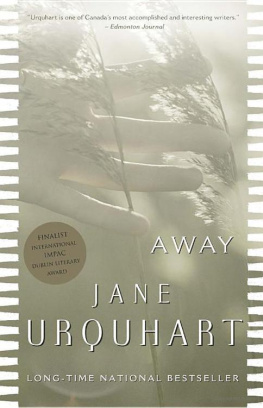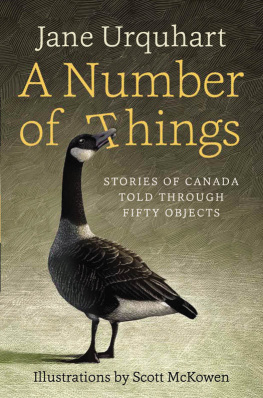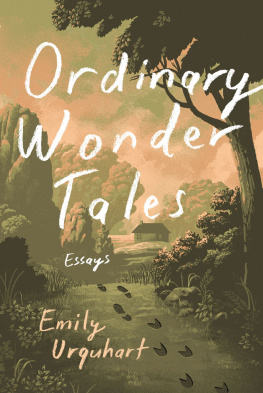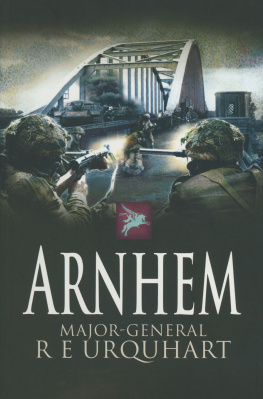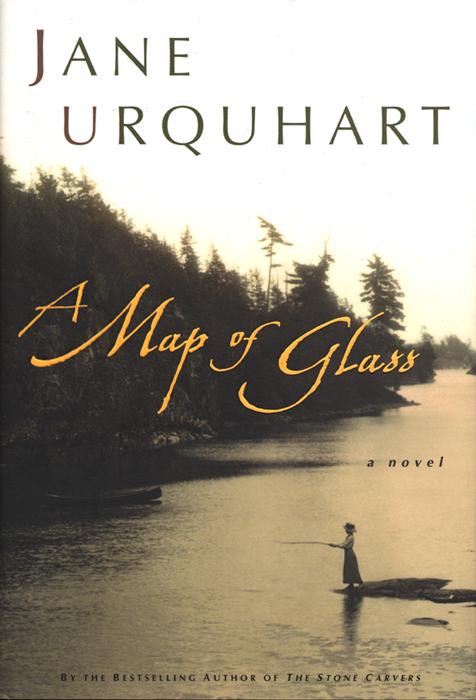Jane Urquhart
A MAP OF GLASS
ebook ISBN: 978-1-59692-839-8
M P Publishing Limited
12 Strathallan Crescent
Douglas
Isle of Man
IM2 4NR
BritishIsles
Telephone: +44 (0)1624 618672
email: info@mpassociates.co.uk
For A.M. to the west of me
And A.M. to the east of me.
They encouraged and inspired.
By drawing a diagram, a ground plan of a house, a street plan to the location of a site, or a topographic map, one draws a logical two dimensional picture. A logical picture differs from a natural or realistic picture in that it rarely looks like the thing it stands for.
Robert Smithson, The Collected Writings
MacAdam/Cage Publishing
155 Sansome Street, Suite 550
San Francisco, CA 94104
www.macadamcage.com
Copyright 2006 by Jane Urquhart
ALL RIGHTS RESERVED
Library of Congress Cataloging-in-Publication Data
Urquhart, Jane.
A map of glass / by Jane Urquhart.
p. cm.
ISBN 1-59692-170-6 (alk.paper)
I.Title
PR9199.3U7M36 2006
813'.54dc22
2006000360
The epigraph is taken from Robert Smithsons essay A Provisional Theoryof Non-Sites (1968). published in Robert Smithson: The Collected Writings, edited byJack Flam. Copyright 1996. Used by permission of the Estate and VAGA (Visual Artists and Galleries Association).
Book design by Dorothy Carico Smith.
Publishers Note: This is a work of fiction. Names, characters, places, and incidents either are the product of the authors imagination or are used fictitiously. Any resemblance to actual events, locales, or persons, living or dead, is entirely coincidental.
H e is an older man walking in winter. And he knows this. There is white everywhere and a peculiar, almost acidic smell that those who have passed through childhood in a northern country associate with new, freshly fallen snow. He recognizes the smell but cannot bring to mind the word acidic. Snow, walking, and winter are the best he can come up with these few words and then the word older, which is associated with effort. Effort is what he is making; the effort to place one foot in front of the other, the effort required to keep moving, to keep moving toward the island. It might have been more than an hour ago that he remembered, and then forgot, the word island. But even now, even though the word for island has gone, he believes he is walking toward a known place. He has a map of the shoreline in his brain; its docks and rundown wooden buildings, a few trees grown in the last century. Does he have the word for trees? Sometimes yes, but mostly no. He is better with landforms. Island though it is gone at this moment is a word that stays longer than most; island, peninsula, hill, valley, moraine, escarpment, shoreline, river, lake are all words that have passed in and out of his mind in the course of the morning, along with the odd hesitant, fragmented attempt at his name, which has come to him only partially, once as what he previously would have called the article An, then later as the conjunction And.
Tears are sliding over the bones of his face, but these are tears caused by the dazzle of the sun in front of him, not by sorrow. Sorrow and the word for sorrow disappeared some months ago. Terror is the only emotion that visits him now, often accompanied by a transparent curtain of blinding gold, but even this is mercifully fleeting, often gone before he fully recognizes it. He does not remember the word gold. He does not remember that in the past he saw the real colors of the world.
He senses an unusually cluttered form in his immediate vicinity: a fence, he once would have called it. It would have brought to mind the path-masters and surveyors of the past, but now he knows it only as something that has not grown out of the earth, something that is impeding his progress. As he stands bewildered near the fence, he looks at the intricate shadows of the wire created by sunlight on the snow in front of him and the word tangle slips into his mind. He walks right through the tangle of the shadow, but is not able to gain passage through the wires themselves.
He does not remember what to do with a fence, how to get over it, through it, past it, but his body makes a decision to run, to charge headlong into the confusion, and in fact this appears to have been the correct decision, for he has catapulted to the opposite side and has landed first on one shoulder, then on his stomach so that his face is in the snow. Snow, he thinks, and then, walking, which is what he must do to reach the island. He gropes for the word island, and has almost conquered it by the time he is back on his feet. But the shape and sound of it slips away again before he can grasp the meaning, slips away and is replaced by a phrase, and the phrase is the place the water touches all around.
He knows the island was the beginning knows this in a vague way, not having the words for either island or beginning. He must get to the place that water touches all around because without the beginning he cannot understand this point in time, this walk in the snow, the breath that comes into his mouth and then departs in small clouds like the ghosts of all the words he can no longer recall. If he can arrive at this beginning, he believes he will remember what was born there, and what came into being later, and later again, and later again a theorem that might lead him to the now of effort and snow.
He begins once again to move forward. Often he bumps against trees, but this does not worry him because he knows they are meant to be there, and will remain after he has passed by them. Like an animal, he is stepping by instinct through the trees, branch by branch, the smell of the destination on the edge of his consciousness. While he is among pines, an image of an enormous raft made of timber floats through his imagination and connects somehow, for an instant, with the word glass, which, in turn, connects again, for just an instant, with the word ballroom. In this daydream there are men with poles standing on the rafts surface. Sometimes they are dancing. Sometimes they are kneeling, praying.
When he comes to a break in the forest, he is perplexed by an area of openness that curls off to the left and to the right. Then, quite suddenly, inexplicably, he remembers a fact about winter rivers and their tributaries, how they become frozen, covered with snow. He is momentarily aware of some of the natural things he used to think about. He enunciates, quite clearly, the syllables of the word watershed, then straightens his shoulders, attentive to, and briefly suspicious of, the deep, bell-like sound of his own voice.
He walks for some time on the hard, pale river, his left sleeve now and then brushing against the arms of snow-laden pines. Eventually his body comes to know it is exhausted and takes the decision to lie on the smooth bed of ice and snow. By now the sun is gone; it is a deep winter night of great clarity and great beauty. He can see points of light that he knows are stars, and yet he no longer knows the word for stars. When he rolls his head to the left and then the right, the still, leafless branches of the trees on the bank move with him, black against a darkening sky. Tributaries, he whispers, and the word fills him with comfort, and also with something larger, something that, were he able to recognize it, would resemble joy.


